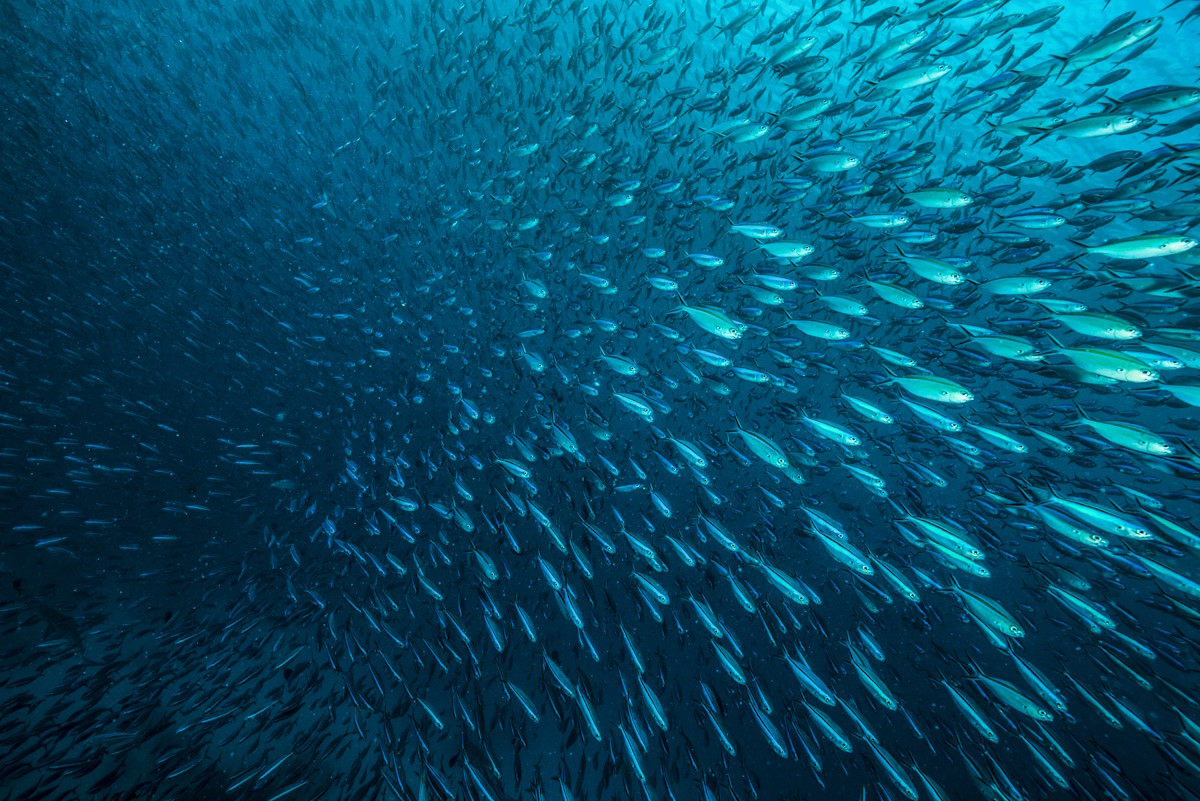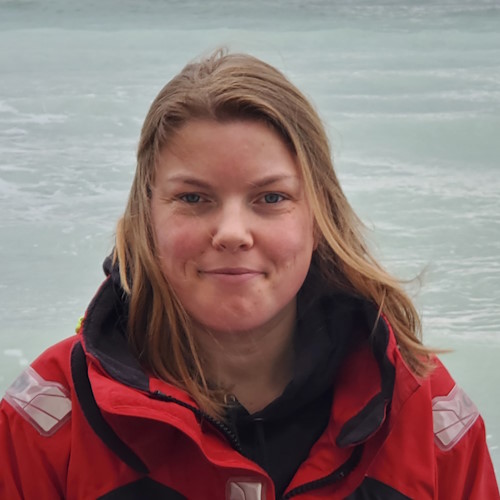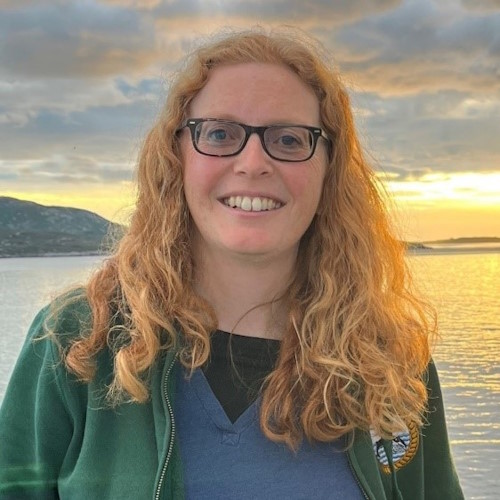Marine biodiversity loss, fishing, and climate change

Discussion meeting organised by Professor Richard Sanders, Professor Alex Poulton, Professor Stephanie Henson, Dr Emma Cavan, and Professor Alessandro Tagliabue.
The twin crises of biodiversity loss and rapid climate change are often considered as inextricably linked, a perspective largely developed based on terrestrial systems. In the ocean this linkage has been largely overlooked and this meeting will address this gap to recognise the role of ocean biodiversity loss in regulating climate and delivering food security.
Poster session
There will be a poster session from 5pm on Monday 8 December. If you would like to present a poster, please submit your proposed title, abstract (up to 200 words), author list, and the name of the proposed presenter and institution to the Scientific Programmes team. Acceptances may be made on a rolling basis so we recommend submitting as soon as possible in case the session becomes full. Submissions made within one month of the meeting may not be included in the programme booklet.
Attending the event
This event is intended for researchers in relevant fields.
- Free to attend
- Both virtual and in-person attendance is available. Advance registration is essential
- Lunch is available on both days of the meeting for an optional £25 per day. There are plenty of places to eat nearby if you would prefer to purchase food offsite. Participants are welcome to bring their own lunch to the meeting
Enquiries: Scientific Programmes team.
Organisers
Schedule
Chair

Professor Richard Sanders
Norwegian Research Centre, Norway

Professor Richard Sanders
Norwegian Research Centre, Norway
Professor Richard Sanders currently serves as the Director of the Integrated Carbon Observing System (ICOS) Ocean Thematic Centre (OTC) in NORCE (the Norwegian Research Centre), and the Bjerknes Centre for Climate Research (BCCR) in Bergen, Norway. He maintains an active research portfolio including coordinating OceanICU, a grant focused on the role industrial processes play in controlling Ocean C storage. Recently, they have begun to address the challenge of how multiple observing systems can work together to address key ocean science questions and Professor Sanders is leading TRICUSO, an EU grant focused on integrating effort from European Research Infrastructures to quantify the Southern Ocean carbon sink.
Prior to his move to Bergen, Professor Sanders served as Chair of the Ocean Biogeochemistry and Ecosystems (OBE) Research Group at the UK National Oceanography Centre. They developed a programme of Biological Carbon Pump research addressing key questions around iron limitation of carbon export in the Southern Ocean, Twilight Zone Carbon cycling and the solubility pump. Core actions included leading the departmental science programme, raising funds, overseeing publications, maintaining financial control over the department, advocating for the department, mentoring and managing & deputising for the Director of Research. Prior to becoming Department Chair, he ran a personal research group which contained one/ two postdocs, one technician, one/ two research fellows and several graduate students.
Professor Sanders has spent over 2 years at sea on NERC vessels including 3 cruises as chief scientist (CROZEX in 2005, and Twilight Zone cruises to the PAP site in 2009 and the Southern Ocean in 2017). Lead PI on NERC Large Grant COMICS (Controls over Ocean Mesopelagic Carbon Storage) and NERC Cross Centre proposal LOCATE (Land Ocean Carbon Transfers).
| 09:00-09:05 |
Welcome by the Royal Society and lead organiser
|
|---|---|
| 09:05-09:30 |
Climate change impacts on biodiversity and ecosystem services

Professor Camille ParmesanCentre National de la Recherche Scientifique, France 
Professor Camille ParmesanCentre National de la Recherche Scientifique, France |
| 09:30-09:45 |
Discussion
|
| 09:45-10:15 |
Examining trade-offs and synergies in the marine food-climate-biodiversity nexus
The ocean’s capacity to sustainably, equitably, and safely produce food is declining due to biodiversity losses driven by overexploitation, climate change, and other human-induced stressors such as pollution. While solutions like fisheries management, aquaculture, and marine protected areas have been proposed to reverse these declines, recent global analyses reveal growing trade-offs and inequities across seafood production, biodiversity conservation, and climate action. This talk explores the application of integrated models—linking climate, biodiversity, seafood production, and economic impacts—to assess how solution portfolios can achieve sustainable and equitable food and conservation goals under climate change. These models incorporate scenarios accounting for both direct and indirect drivers, including ocean conditions, demographic shifts, seafood demand and pricing, fisheries governance, and aquaculture development. Projections indicate that achieving sustainable seafood security and biodiversity goals will require ambitious action across multiple fronts: reducing fishing effort, advancing sustainable aquaculture, expanding marine protected areas, and strengthening climate mitigation. Climate change particularly threatens the capacity to provide nutrient-rich seafood and restore biodiversity and biomass in low and middle-income tropical nations and vulnerable communities in extra-tropical regions. The findings highlight the synergies and trade-offs in pursuing food, climate, and biodiversity targets. The presentation emphasises the need for equity- and conservation-focused ocean governance and for limiting global warming to below 1.5°C, and underscores the value of participatory scenario modelling to co-develop resilient, just, and sustainable marine conservation strategies. 
Professor William CheungThe University of British Columbia, Canada 
Professor William CheungThe University of British Columbia, Canada Dr William Cheung is a Professor and Director of the Institute for the Oceans and Fisheries, the University of British Columbia, and a Canada Research Chair in Ocean Sustainability and Global Change. He studies the nexus of food-climate-biodiversity in the ocean. His research applies transdisciplinary approaches that integrate scenarios and models with participatory methods to (1) understand the risk and impacts of climate change on marine ecosystems, biodiversity, fisheries and people who are dependent on it, and (2) explore solution options and pathways to desirable and sustainable ocean futures. He serves as director for the 6-year international Partnership “Solving Sustainability Challenges at the Food-Climate-Biodiversity Nexus (Solving-FCB)”. His work addresses policy-relevant research questions and cuts across multiple disciplines, from oceanography to ecology, economics and social sciences. His research ranges from local to global scales. William is actively involved in international and regional initiatives that bridge science and policy, including the Intergovernmental Panel on Climate Change (IPCC) and the Intergovernmental Platform on Biodiversity and Ecosystem Services (IPBES). |
| 10:15-10:30 |
Discussion
|
| 10:30-11:00 |
Break
|
| 11:00-11:20 |
Feedbacks between changing communities, bio-geographies and ocean biogeochemistry
Dr Stephanie DutkiewiczMassachusetts Institute of Technology, USA Dr Stephanie DutkiewiczMassachusetts Institute of Technology, USA |
| 11:20-11:30 |
Discussion
|
| 11:30-11:50 |
Tara oceans and insights into biodiversity
Dr Lionel GuidiCentre national de la recherche Scientifique, France Dr Lionel GuidiCentre national de la recherche Scientifique, France |
| 11:50-12:00 |
Discussion
|
| 12:00-12:20 |
Experimental approaches for understanding trait plasticity and rapid evolution in phytoplankton
Plastic and evolutionary responses to climate change in marine primary producers has the potential to affect biogeochemical processes and higher trophic levels, but breaking this down into processes that can be understood, quantified, contextualised, and modelled is challenging. Microbial experiments are useful in that controlled and replicated laboratory experiments can establish causal links between drivers and organismal responses, and functional forms of relationships between trait values and environmental states can be defined. However, contextualising microbial eco-evolution experiments requires close collaborations between experimentalists and modelers, as well as the development of experimental systems that can (and do) provide both process-based and ecosystem-specific knowledge. Professor Collins will discuss recent advances in phytoplankton ecophysiology and evolution experiments in terms of how they can contribute to our ability to explain and model shifts in primary production under multiple environmental changes, and highlight gaps in linking this to biodiversity shifts. 
Professor Sinéad CollinsUniversity of Edinburgh, UK 
Professor Sinéad CollinsUniversity of Edinburgh, UK Sinéad Collins is a professor at the Institute of Ecology and Evolution at the University of Edinburgh. Her goal is to predict how primary producers in the ocean will respond to global change in the coming decades. To do this, she uses microbial evolution experiments and simulations to link short-term responses such as phenotypic plasticity and epigenetic changes, to evolution. She also investigates how different patterns and numbers of environmental changes affect plastic and evolutionary trait changes. Currently, much of her research focuses on marine diatoms responding to multiple simultaneous environmental changes as well as developing laboratory systems for investigating polar adaptations in phytoplankton. |
| 12:20-12:30 |
Discussion
|
Chair

Professor Alex Poulton
Norwegian Research Centre, Norway

Professor Alex Poulton
Norwegian Research Centre, Norway
Professor Poulton is a sea-going marine scientist exploring the quantitative links between plankton diversity and biogeochemical cycles. Professor Poulton uses field observations and experiments to examine how biomineralising plankton influence the cycling of elements essential for marine life, such as carbon, nitrogen, silica, and iron. As a field scientist he has worked across the global ocean, from the tropics to the poles and from the coast to the open ocean, participating in 23 expeditions aboard national and international research vessels. His current research focus is on the production and loss processes associated with marine carbonates, and how they respond to natural and anthropogenic pressures. Professor Poulton did a PhD and postdoc at the University of Southampton, and then a NERC fellowship at the National Oceanography Centre (NOC) and subsequently became a member of staff at the NOC. In 2017 he left NOC and took up a position in Heriot-Watt’s new Global Research Institute, the Lyell Centre for Earth and Marine Science, a joint venture between NERC, the Scottish Funding Council and Heriot-Watt University. Professor Poulton heads the OceanCANDY (Carbon and nutrient dynamics) research group at Heriot-Watt University. Professor Poulton heads the OceanCANDY (Carbon and nutrient dynamics) research group at Heriot-Watt University, is the co-convenor of the Biogeochemistry Forum for MASTS (Marine Alliance for Science and Technology for Scotland) and from October will become the chair of the UK SCOR (Scientific Committee on Oceanic Research) panel (he is currently the Vice-Chair).
| 13:30-14:00 |
Variable linkages between biodiversity and stoichiometry in the plankton
Ocean systems are characterised by diverse phytoplankton assemblages that themselves vary on a range of time-scales, but the question remains how phytoplankton biodiversity is reflected in the stoichiometry of particulate matter, the Redfield Ratio, in the ocean. In the open ocean it is generally concluded that the linkage between biodiversity and stoichiometry is through the variability in larger phytoplankton (eg diatoms) to smaller picophytoplankton (eg cyanobacteria). At the Bermuda Atlantic Time-series Study (BATS) site, this is generally the case with a seasonal increase in particulate organic carbon to phosphorus (POC:P) ratios that align with the seasonal accumulation of Prochlorococcus biomass. A similar pattern is observed over longer time series records, where again at BATS a multi-year increase in the POC:P ratio is aligned with the dramatic reduction in the presence of larger phytoplankton. The same observation cannot be said for spatial relationships between phytoplankton biodiversity and stoichiometry where despite similar patterns in phytoplankton assemblages, variability in the physical environment induces a complex interplay between biodiversity and phytoplankton physiological acclimation. A broader ocean look at the relationships between phytoplankton physiology, biodiversity, and plankton stoichiometry support a similarly complicated relationship mediated by ocean physics. These relationships are not just restricted to the tropical and subtropical latitudes. With ocean warming, populations of cyanobacteria, Synechococcus, are becoming more prevalant in Arctic ecosystems and already having a demonstrated impact on stoichiometry. The impacts of these interactions on marine biogeochemistry and the functioning of ocean food webs is only now beginning to be understood. 
Dr Michael LomasBigelow Laboratory for Ocean Sciences, USA 
Dr Michael LomasBigelow Laboratory for Ocean Sciences, USA Michael Lomas is a marine biogeochemist with a broad interest in the role that phytoplankton diversity and physiology plays in mediating the key processes of the biological carbon pump, and the associated macronutrient cycles. Lomas holds a PhD in Biological Oceanography from the University of Maryland at College Park, where he studied how different marine phytoplankton assimilate nitrogen under variable light regimes. After his PhD Lomas spent 12 years in Bermuda as a principle investigator (PI) on the Bermuda Atlantic Time-series Study (BATS) program. While remaining a BATS co-PI, Lomas has since moved on to become a Senior Research Scientist at Bigelow Laboratory for Ocean Sciences where his oceanographic research interests in microalgae physiology and ecology and marine biogeochemistry have remained the same, but now also include work in the US Arctic seas. In 2014, Lomas was appointed as Director of the Provasoli-Guillard National Center for Marine Algae and Microbiota (NCMA) which is based at Bigelow Laboratory. During his tenure as Director, NCMA has expanded its capabilities as a biological resource for algae science and innovation, in particular he has spearheaded development of a regional US project focused on improving the efficiency with which amazing algal research is being translated into use-inspired innovations that may solve some of our largest societal challenges. |
|---|---|
| 14:00-14:15 |
Discussion
|
| 14:15-14:45 |
Warming-driven shifts in North Atlantic plankton
The Continuous Plankton Recorder (CPR) survey provides the longest and most spatially extensive plankton time-series in the North Atlantic, essential for detecting long-term biodiversity changes. Using CPR data from the Labrador Sea and North-West Atlantic, we show that since the 1980s, warming has driven increased diatom abundance at higher latitudes, where enhanced stratification and a weakened Labrador Current have reduced light limitation. Meanwhile, diatom abundance has declined in subtropical regions due to intensified nutrient limitation. Ecological niche models suggest this trend may soon reverse, with nutrient constraints increasingly outweighing light availability, leading to an overall decline in diatoms and a shift towards more elongated taxa and dinoflagellates, signalling a potential tipping point toward reduced productivity and carbon export in the Subpolar Gyre (SPG). These findings highlight how shifts in plankton communities could cascade through marine ecosystems, affecting food webs and carbon cycling, given varying carbon export efficiencies among species. Long-term datasets provided by the CPR alongside enhanced measurements, remain vital for tracking these dynamics, improving our ability to predict and respond to emerging biophysical shifts in the ocean. 
Dr Clare OstleThe Marine Biological Association, UK 
Dr Clare OstleThe Marine Biological Association, UK Clare specialises in marine biogeochemistry, data integration, and analysis, particularly exploring the impact of plankton communities on the marine carbonate system. Her PhD at the University of East Anglia investigated the influence of plankton activity and abundance on carbon dioxide flux variability in the North Atlantic. Clare has worked with CPR data since her undergraduate studies at Swansea University, where she analysed copepod abundance and distribution in relation to temperature. She also has experience estimating net community production using oxygen optodes on volunteer ships and is interested in instrument development and sampling enhancements for the CPR. Clare has contributed to synthesis reports on topics including ecological indicators for European marine policy, ocean warming, acidification, and marine plastics. In 2020, she became the coordinator of the Pacific CPR survey, and in 2024, she was appointed Chair of the Global Alliance of CPR Surveys (GACS). |
| 14:45-15:00 |
Discussion
|
| 15:00-15:30 |
Break
|
| 15:30-15:50 |
Bio-GO-SHIP: A platform to monitor ocean biodiversity
Marine plankton are an essential component of the earth climate system, form the base of the oceanic food web and thereby play an important role in influencing food security and contributing to the Blue Economy. Despite their importance, open ocean biological properties are significantly under-sampled in time and space compared to physical and chemical properties. This lack of information hampers our ability to understand the role of plankton in regulating in biogeochemical processes and fuelling higher trophic levels, now and in future ocean conditions. Traditionally, many of the methods used to quantify biological and ecosystem essential ocean variables (EOVs), measures that provide valuable information on the ecosystem, have been expensive and labour- and time-intensive, limiting their large-scale deployment. In the last two decades, however, new technologies have been developed and matured, making it possible to greatly expand biological ocean observing capacity. This talk will present recent advances in building international coordination to incorporate routine open ocean observations of marine biological properties and processes into the existing GO-SHIP decadal repeat hydrography program. Existing challenges in observing technology and infrastructure and the progress that can be achieved over the next decade with expanded observations of ocean biology will be discussed. 
Dr Sophie ClaytonNational Oceanography Centre, UK 
Dr Sophie ClaytonNational Oceanography Centre, UK Dr Sophie Clayton received her PhD in Physical Oceanography from the MIT/WHOI Program in Oceanography, was an Innovation in Data Science Postdoctoral Fellow at the University of Washington in Seattle and then spent five years as an Assistant Professor in Oceanography at Old Dominion University, Virginia, USA. She recently returned to the UK to take up a Principal Investigator in Marine Biogeochemistry position at the UK's National Oceanography Centre. Her research is broadly focused on better understanding how dynamic physical features in the ocean (eddies, fronts, boundary currents) interact with chemical and biological processes to shape phytoplankton communities and modulate vertical and lateral biogeochemical fluxes. She has worked with numerical models to understand the balance of physical circulation and ecological processes in creating hotspots of phytoplankton biodiversity in boundary current regions, as well as collecting data in the field to further understand the role ocean physics in modulating plankton biodiversity. She works towards developing international coordination in expanding observations of open ocean biodiversity and developing best practices for biogeochemical sensors and phytoplankton imaging instruments, as well as collaborating with technologists and engineer to develop new sampling systems to support the expansion of routine biological sampling at sea. |
| 15:50-16:00 |
Discussion
|
| 16:00-16:20 |
Incorporating mixotrophy and microbial functional diversity into ocean biogeochemical models
Most large-scale ocean biogeochemical models rely on highly simplified and discrete representations of plankton, structured around a strict distinction between phytoplankton and zooplankton across a limited number of immutable plankton functional types. This discrete approach overlooks the empirical reality that the ocean microbiome is functionally far more diverse, with individual species occupying a continuum of ecological strategies. As an illustrative case, the widespread prevalence of mixotrophic organisms in the ocean calls into question an understanding of ocean biogeochemistry that assumes a strict dichotomy between photosynthetic phytoplankton and heterotrophic zooplankton. In this talk I shall discuss how modelling approaches that describe the marine microbiome in terms of continuously varying traits - rather than as a discrete selection of functional groups - is well suited to addressing this functional diversity. Where mixotrophy has been included in models, it can be seen that access to nutrients from prey can support larger cell sizes, longer food chains, and more efficient carbon export. I will explore how these findings impact ocean biogeochemistry and climate at the global scale, over long time periods. I will also discuss how such models are impact by crude underlying assumptions, and what empirical constraints are needed to bring down large uncertainties. This talk will therefore focus on recent efforts to include mixotrophy and greater functional diversity in trait-based and adaptive ecosystem models, and will explore what these models can teach us, what their limitations are, and what kinds of data are needed to make further progress. 
Dr Ben WardUniversity of Southampton, UK 
Dr Ben WardUniversity of Southampton, UK Ben Ward is an associate professor and University Research Fellow working at the University of Southampton. He uses ecological theory and computer modelling to understand the global-scale structure of marine microbial communities and how these influence ecosystem functions including productivity and climate regulation. A particular challenge of this approach is the sheer abundance of organisms within these systems - there are more plankton in the ocean than stars in the observable universe. In light of this complexity, Ward's research focusses on developing models that allow large-scale patterns of biodiversity and ecosystem function to emerge given simple assumptions regarding how organisms compete and evolve within the fluid ocean environment. A current focus in Ward's research group in Southampton is to broaden the scope of marine ecology to better account for the previously under-investigated roles of rapid evolution, dispersal and genetic drift, and how these impact the dynamic ocean and Earth system. |
| 16:20-16:30 |
Discussion
|
| 16:30-17:00 |
Poster flash talks
|
Chair

Dr Emma Cavan
Imperial College London, UK

Dr Emma Cavan
Imperial College London, UK
Emma is an Associate Professor at Imperial College London based in the Department of Life Sciences at Silwood Park. Her expertise lies with carbon cycling by marine life, specifically within the ocean biological carbon pump. She is particularly interested in the role of zooplankton, Antarctic krill and their faeces in sinking carbon to the deep ocean, microbial turnover of carbon and sequestration times. She is also interested in the impacts of fishing on oceanic carbon, and co-chairs an ICES working group/workshop on this subject.
| 09:00-09:30 |
Biodiversity in Twilight Zone functioning
The ocean's mesopelagic of 'twilight' zone (~200m to 1000m) is one of the largest habitats on this plant, and home to an abundant and diverse fauna. The species inhabiting this zone posses a multitude of behavioural, physiological, and structural adaptations that allow them to thrive in this cold, dark, and relatively food-poor environment. Twilight zone organisms influence the cycling of nutrients and long-term storage of carbon in the ocean and are a conduit for energy flow between depth zones, functions that will be affected by climate warming and exploitation by humans. Professor Steinberg will discuss important ways in which biodiversity and abundance affects the structure of mesopelagic food ways in which biodiversity and abundance affects the structure of mesopelagic food webs and carbon cycling using examples from contrasting ecosystems in the North Atlantic, North Pacific, and Southern Ocean. Examples will illustrate how species vertical zonation and diel migration affects the export of organic matter, and how some species paly an outsized role in carbon export or other ecosystem functions. The importance of ocean time series observations and new technologies for detecting change in mesopelagic biodiversity and function will be stressed and knowledge gaps will be identified for future research. 
Professor Deborah SteinbergVirginia institute of Marine Science, USA 
Professor Deborah SteinbergVirginia institute of Marine Science, USA Deborah Steinberg is a Professor of Marine Science at the Virginia Institute of Marine Science (VMS), William & Mary. She is a biological oceanographer with research interests that include the role of zooplankton in cycling of carbon and nutrients, the food web of the ocean twilight zone, and the effects of climate change on zooplankton community structure. She has conducted field research across the world's oceans and is currently co-lead of the Palmer Antarctica Long-Term Ecological Research program and a principal investigator for the Bermuda Atlantic Time-series Study. Steinberg earned her doctorate from the University of California, Santa Cruz. Before coming to VIMS in 2001, Steinberg was a research scientist at the Bermuda Institute of Ocean Sciences. She has served in numerous leadership positions in the broader oceanographic community including as chair of the University National Oceanographic Laboratory System that advises the US academic research fleet. Her honours include the Sverdrup Lecture Award from the American Geophysical Union for outstanding contributions to and promotion of cooperation in oceanographic research, and the State Council of Higher Education for Virginia Outstanding Faculty Award. Professor Steinberg has served as major adviser for 20 doctoral and master's students and teaches courses on Biological Oceanography and Scientific Communication Skills. |
|---|---|
| 09:30-09:45 |
Discussion
|
| 09:45-10:15 |
Linking ecosystem structure and production to carbon sequestration
The sinking of detrital organic matter is the main contribution of living ocean ecosystems to climate regulation. The modelling of this “biological pump” in contemporary Earth System Models commonly assume that the dominant component is dead photosynthetic bacteria because they have the fastest life cycle. However, due to their small size dead bacteria sink slowly and are remineralised before reaching the sea floor. It has recently become clear that higher organisms, multicellular zooplankton and fish, are also important contributors to the biological carbon pump. Even though their rate of production of sinking faecal pellets is slow, the pellets are large and sink rapidly into the ocean interior, where the carbon is sequestered over long time. Here, Professor Andersen will use simple metabolic arguments to demonstrate how organisms of different sizes and trophic levels contribute to the biological carbon pump. The talk will augment the theoretical arguments with simulations of detailed models of unicellular plankton, multicellular zooplankton, cephalopods, and fish. The presentation will argue that understanding the biological carbon pump requires that we describe the entire ecosystem, from bacteria to whales, to quantify the contributions of each organism group in the ecosystem, and how they interact. Such full ecosystem models are required to understand how the climate regulating ability of the ocean’s ecosystem will change under future climates, and how it is affected by human interventions. 
Professor Ken H AndersenTechnical University of Denmark, Denmark 
Professor Ken H AndersenTechnical University of Denmark, Denmark Ken H Andersen has a background is in theoretical physics: non-linear systems, pattern formation, and turbulence. In the last 20 years he has worked with marine science: fisheries ecology, plankton ecology, and general theoretical ecology. He has synthesised the scattered ideas about body size-based modelling into a coherent framework and applied it to plankton ecology, fisheries ecology, and food-web modelling. A recent key discovery is how the macroecological patterns of morphology and strategies of organisms – from bacteria to whales – are determined by the limitations set by body size, by physics and chemistry, and by evolution. This insight transforms our understanding of the diversity of life away from empirical patterns of species towards the limitations set by fundamental laws of physics. The size- and trait-based approach to fish population and community dynamics has revolutionised population models of fish. The framework provides the theoretical basis and practical implementation to deal with modern challenges to fisheries management: data-poor stock assessments, fisheries induced evolution, and ecosystem-based impact assessments of fisheries, as well as evolutionary ecology. The framework is unique in ecological theory by being built on just three central assumptions yet having a wide practical applicability. |
| 10:15-10:30 |
Discussion
|
| 10:30-11:00 |
Break
|
| 11:00-11:20 |
Biodiversity of fish communities: human impacts and resilience
Professor Julia BlanchardUniversity of Tasmania, Australia Professor Julia BlanchardUniversity of Tasmania, Australia |
| 11:20-11:30 |
Discussion
|
| 11:30-11:50 |
Oceanographic drivers of carbon storage in European seagrass beds
Salt marshes, mangroves, and seagrass meadows are vegetated coastal marine ecosystems that remove atmospheric carbon dioxide (CO2) through photosynthesis and trap allochthonous carbon from adjacent terrestrial and marine sources. Despite covering a small fraction of the Earth’s surface, these “blue carbon” ecosystems bury carbon at disproportionately high rates, making them relevant to climate mitigation. Seagrass meadows are found along many European coastlines, but currently no countries have included them in their emission inventories and climate plans. One reason for this relates to the challenge of mapping seagrass habitats and estimating carbon stocks. We examine whether oceanographic data products, including those derived from satellites, can be used to estimate organic carbon stocks in seagrass meadows and support the development of a mapped product. Relevant abiotic and biotic variables for seagrass carbon storage were identified and datasets downloaded from NASA and Copernicus and spatially matched to seagrass sediment organic carbon measurements in the EURO-CARBON database. A suite of models was tests to identify the top predictors of seagrass organic carbon storage. We found high model explanatory power across the range of tested models (R2 > 0.8), with sea surface wave height, phosphate concentration, near-surface pH, bottom temperature, and remote sensing reflectance at 443 nm as some key predictors. Mixed species seagrass beds showed reduced carbon storage in comparison to monospecific beds. Policy needs for reporting carbon stocks are growing, and we show how remote sensing and global oceanographic data products can contribute to mapping blue carbon benefits in Europe. 
Dr Natalya GalloNorwegian Research Centre, Norway 
Dr Natalya GalloNorwegian Research Centre, Norway Dr Natalya Gallo is a marine ecologist and biological oceanographer working at the Norwegian Research Centre (NORCE) in Bergen, Norway and is affiliated with the Bjerknes Centre for Climate Research. Her overarching interests are in how climate change impacts marine ecosystems and how scientific research can support sustainable ocean management, including in topics such as blue carbon and marine carbon dioxide removal (mCDR). She has worked in deep sea fjords and oxygen minimum zone regions to examine the effects of low oxygen environments on vertebrate and invertebrate community biodiversity and food web patterns. She is passionate about the science-policy interface and has participated in multiple UN ocean and climate conferences. She is an advisory panel member of the IOC-UNESCO Global Ocean Oxygen Network, is a co-lead of the Deep Ocean Stewardship Initiative Climate Change Working Group, and is a member of the Early Career Ocean Professionals group of the UN Decade of Ocean Science for Sustainable Development. As a researcher at NORCE, she is working on two Horizon EU projects relating to the ocean-climate interface: OceanICU on ocean carbon uptake, and MARCO-BOLO on marine coastal biodiversity long-term observations. She also serves on the University of Bergen advisory council for the Norway-Pacific Ocean-Climate Scholarship Programme, an interdisciplinary PhD programme between the University of Bergen and the University of the South Pacific. She received her PhD from the Scripps Institution of Oceanography at UC San Diego in 2018. |
| 11:50-12:00 |
Discussion
|
| 12:00-12:20 |
Title to be confirmed
Dr Mary S WiszTechnical University of Denmark, Denmark Dr Mary S WiszTechnical University of Denmark, Denmark |
| 12:20-12:30 |
Discussion
|
Chair

Professor Stephanie Henson
National Oceanography Centre, UK

Professor Stephanie Henson
National Oceanography Centre, UK
Professor Stephanie Henson is a Principal Scientist at the National Oceanography Centre and Honorary Professor at the University of Southampton. She leads a large, active research group in global biogeochemical oceanography. Her particular research interests aim at understanding the natural variability and climate change effects on phytoplankton populations, and subsequent impacts on the biological carbon pump. Her research exploits autonomous vehicles, satellite and in situ data, as well as output from biogeochemical models. In 2024, she received the European Geosciences Union’s Fridtjof Nansen medal for “outstanding research into the ocean’s role in the carbon cycle, built on her extraordinary ability to combine diverse observational data with novel biogeochemical models.” She was a lead author on the Intergovernmental Panel on Climate Change’s 6th Assessment Report, on the chapter “Carbon and other biogeochemical cycles and feedbacks”.
| 13:30-14:00 |
Fossil biodiversity and ecosystem function: insights from marine plankton
The fossil record offers critical insights into how biodiversity, biogeography, and ecosystem function respond to climate change over geological timescales. Planktonic foraminifera, with their exceptional fossil preservation, global distribution, and ecological diversity, provide a uniquely powerful system for examining these long-term dynamics in the open ocean. Their record captures changes in species richness, ecological traits, and community composition across major climate perturbations, allowing for an assessment of how environmental stress reshapes both ecosystem structure and spatial patterns of biodiversity. This contribution synthesises data on shifts in foraminiferal biogeography alongside evidence for ecological and functional turnover. It explores how these spatial dynamics relate to broader environmental drivers such as ocean temperature, productivity, and stratification, and considers the extent to which biogeographic and functional responses vary during periods of rapid climate change. Understanding these relationships in the deep past provides a valuable baseline for assessing the resilience of modern marine ecosystems. The fossil record of planktonic foraminifera demonstrates that rapid environmental change does not always equate to functional collapse and highlights the conditions under which ecosystem processes persist or reorganise in response to environmental stress. These insights are essential for informing biodiversity and ecosystem service frameworks in the context of ongoing and future climate change. 
Dr Tracy AzeUniversity of Plymouth, UK 
Dr Tracy AzeUniversity of Plymouth, UK Dr Tracy Aze is a marine palaeoecologist whose research focuses on the evolutionary and ecological dynamics of planktonic foraminifera. These single-celled marine organisms have an extraordinary fossil record that captures their biodiversity and biogeography over millions of years, offering an unparalleled insight into how marine ecosystems respond to environmental change on geological timescales. Tracy’s work integrates direct sampling of the fossil record, phylogenetic methods, and geochemical data to investigate the drivers of species longevity, extinction, and resilience in the open ocean. By combining macroevolutionary theory with high-resolution fossil data, she aims to understand how ecological traits and environmental factors shape patterns of survival and loss across deep time. She is Chair of the Neogene and Quaternary Planktonic Foraminifera Working Group and actively contributes to international efforts to improve taxonomic standards and training in the micropalaeontological community. She is also committed to fostering a supportive research culture and mentoring the next generation of scientists in palaeontology and evolutionary biology. Tracy brings a long-term perspective to contemporary questions about biodiversity change, highlighting the value of the fossil record in understanding the resilience and vulnerability of marine ecosystems under climate stress. Her research offers essential context for interpreting current biodiversity trajectories and contributes to broader discussions about the role of past events in shaping future outcomes. |
|---|---|
| 14:00-14:15 |
Discussion
|
| 14:15-14:45 |
Adaptive evolution and its impact on global phytoplankton diversity and productivity
This study investigates global phytoplankton dynamics using a novel ocean ecosystem model that incorporates adaptive evolution of key traits (nutrient uptake, temperature optima, and solar radiation optima). Contrary to the prevailing theory that rising temperatures directly increase phytoplankton diversity, the simulations reveal that global phytoplankton diversity is primarily driven by primary productivity and vertical mixing, not temperature (LeGand et al submitted). Diversity is lowest in nutrient-poor subtropical gyres and permanently mixed Southern Ocean waters, while hotspots occur at the convergence of cold and warm western boundary currents. Furthermore, the study assessed the efficiency of adaptive evolution in these populations. Findings suggest that phytoplankton adapt well to spatio-temporal temperature shifts, but not to changes in nutrient conditions or solar irradiance. This maladaptation, particularly to solar irradiance, significantly hinders global primary production and redistributes its spatial patterns, with local variations up to 20% (Sauterey et al submitted). These results emphasise that omitting phytoplankton (mal)adaptation from current ocean ecosystem models compromises their accuracy in predicting both present-day phytoplankton ecology and future ocean primary production under climate change scenarios. 
Dr Pedro CermenoConsejo Superior de Investigaciones Científicas, Spain 
Dr Pedro CermenoConsejo Superior de Investigaciones Científicas, Spain Pedro Cermeno holds a PhD in Biological Sciences (2006) and has a track record of highly competitive postdoctoral fellowships, including the Fulbright Program and the Marie Curie International Fellowship Program. He is currently research scientist at the Institute of Marine Sciences in Barcelona, Spain. His international research experience spans leading institutions such as Rutgers University, MIT, and Columbia University's Lamont Doherty Earth Observatory. He has coordinated eight competitive national and international research grants and has published over 60 scientific papers, including contributions to Nature, Science, and PNAS. Pedro's core research interests are dedicated to understanding marine life's evolutionary and ecological dynamics, specifically how biodiversity emerges, recovers from mass extinctions, and responds to the Anthropocene crisis. A significant focus of his work is on improving predictions of ocean plankton distributions and their role in biogeochemical fluxes under future climate change scenarios. Beyond fundamental research, Pedro actively explores the commercial expansion of sustainable microalgal feedstocks and is committed to translating scientific knowledge into societal solutions for ecosystem protection and a more habitable planet. |
| 14:45-15:00 |
Discussion
|
| 15:00-15:30 |
Break
|
| 15:30-16:00 |
Modelling ecosystem dynamics and carbon cycle interactions in a rapidly changing environment
The impacts of climate change on marine ecosystems and the cascading feedbacks on the carbon cycle and climate have been highlighted as a “known-unknown” in the past four Assessment reports of the IPCC. The quantification of ecosystem-led carbon-climate feedbacks requires a realistic representation of marine ecosystem structure and functioning in global ocean carbon cycle models. Here, Professor Le Quéré will present an effort to introduce functional diversity in the PlankTOM global ocean biogeochemistry model based on the representation Plankton Functional Types (PFTs), grouping organisms according to their influence on carbon fluxes. PlankTOM uniquely represents explicitly heterotrophic bacteria/archaea, six types of phytoplankton, and five types of zooplankton. The model parameters are set following three optimisation logic using available observations, producing three branches based on the same model structure and physical environment but with different outcomes. Results show how the differences in ecosystem outcomes transfer through to differences in carbon dynamics, including primary and secondary production, and carbon export to the ocean interior. We then use emergent properties of the model to evaluate proximity to observed ecosystem dynamics. We further demonstrate that the addition of a viral component exerts an important influence on recycling and export. The presentation will argue that a new generation of Ocean Systems Models (OSM) is needed to build the tools necessary to address marine issues including ecosystem-led carbon-climate feedbacks, risks of ecosystem shifts and tipping points, ocean productivity and food resources, and the effectiveness of proposed active marine carbon dioxide removals. 
Professor Corinne Le Quéré CBE FRSUniversity of East Anglia, UK 
Professor Corinne Le Quéré CBE FRSUniversity of East Anglia, UK Corinne Le Quéré is Royal Society Research Professor of Climate Change Science at the University of East Anglia (UEA), UK. She conducts research on the interactions between climate change and the carbon cycle, including those mediated by marine ecosystems. She spearheads the development of marine carbon-cycle models that include the representation of marine ecosystems regrouped by Plankton Functional Types (PFTs). She instigated and led for 13 years the annual update of the global carbon budget within the Global Carbon Project, and was author of three assessments reports by the Intergovernmental Panel on Climate Change, and is former Director of the Tyndall Centre for Climate Change Research. She is member of the UK Climate Change Committee and was the founding Chair of France's High Council on climate, two independent committees that advise their respective Governments on how to respond to climate change. |
| 16:00-16:15 |
Discussion
|
| 16:15-17:00 |
Panel discussion: overview and future directions

Professor Alessandro TagliabueUniversity of Liverpool, UK 
Professor Alessandro TagliabueUniversity of Liverpool, UK Professor Tagliabue is a Professor at the University of Liverpool and an ocean biogeochemist, interested in how the cycling of resources in the sea affects biological activity and vice-versa. He is particularly interested in trace micronutrients and how they interact together to shape primary production, ecosystem structure and the global carbon cycle. His science links numerical models, at both global and idealised scales, with both fieldwork and synthesis of datasets. He is heavily involved in the international GEOTRACES programme, he is a lead author on the IPCC Special Report on Oceans and Cryosphere in a Changing Climate and is a member of the governing council of the UK Challenger Society for Marine Science. He is also UK Chair for SCOR and sits on the Royal Society Global Environment Research Committee. |





